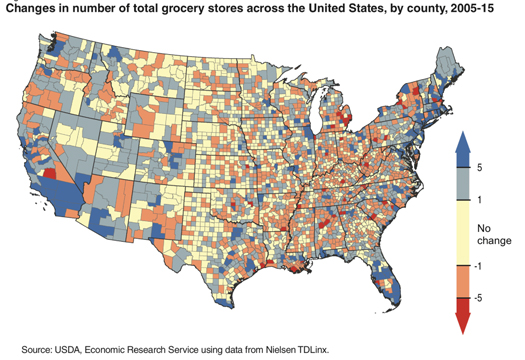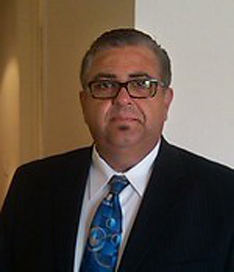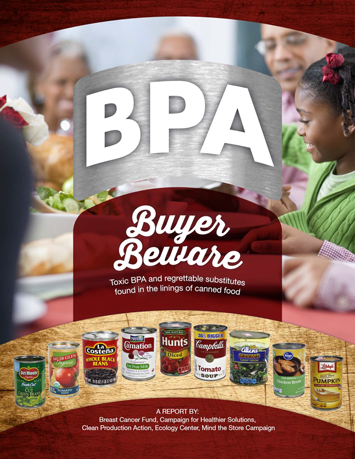National Coalition Works To Lessen Toxic Chemicals In Store Products
By Barrington M. Salmon -Contributing Writer- | Last updated: Jun 19, 2019 - 8:19:13 AMWhat's your opinion on this article?

|
Jose Bravo said he and members of The Campaign for Healthier Solutions have been working for four years to convince executives of The Dollar General Corporation to agree to meet with them.
If they met face-to-face, Mr. Bravo said, he and others would urge the corporation’s leaders to move to protect customers from toxic chemicals present in food, products and toys. The members of the group—customers, experts and other campaign members—purchased shares to gain access to the shareholder’s meeting and were able to share their concerns directly with executives and some of the corporation’s top shareholders.
The activists encouraged executives to embrace the idea of moving toward publicly accountable chemicals management policies.
The activists also held a brief meeting with the Dollar General executive team after the shareholder activities but weren’t able to extract promises or intentions to trigger any actions that would safeguard and enhance customer health and safety. Mr. Bravo said he is not deterred.

José Bravo
|
Traci Gregoire of the Learning Disabilities Association of America agreed. “Our testing has revealed phthalates linked to lower IQ and ADHD in children’ products, heavy metals in toys and plastics, BPA in canned food, and even PFOS in popcorn,” she said. “It’s unacceptable to sell products containing toxic chemicals linked to learning and developmental disabilities, and Dollar General’s executives alone have the power to get toxic chemicals out of their supply chain.”
Perfluorooctanesulfonic acid (PFOS) or perfluorooctane sulfonate (PFOA), is a man-made fluorosurfactant and global pollutant. The Environmental Protection Agency, researchers and members of the medical community have found that exposure to the pollutant causes birth defects, delayed development, and newborn deaths in lab animals. Research shows that PFOS and PFOA were used for decades to produce goods such as clothing, cookware, adhesives and water repellent material.
Smokestacks from factories emitted the chemicals, which drifted to the ground and when it rained, these toxic chemicals dissolved and moved through the soil, entering ground water. Both pollutants have recently been phased out of production in the U.S. But the chemical can linger in water for decades. Like lead, bioaccumulation is a large concern for PFOA and PFOS since the chemicals can build up in the body over time. In general, the effects of PFOA/ PFOS are higher for the young and the unborn.
The EPA declared the presence of both in drinking water a threat to public health after results showing that both in drinking water are carcinogenic. These toxic chemicals are linked with an increased risk for at least six major diseases: diagnosed high cholesterol; ulcerative colitis; thyroid, testicular and kidney cancer; and pregnancy-induced hypertension.
Headquartered in Chesapeake, Virginia, Dollar Tree is the largest and most successful single-price-point retailer in North America, operating thousands of stores, according to its website.
The Final Call reached out to Dollar General and Dollar Tree/Family Dollar corporate headquarters via telephone and email for comments and reaction but at press time no one had responded.
Most vulnerable, least protected
According to a June 13 press release from Eric Whalen of the Campaign for Healthier Solutions, customers and parents attended the annual shareholder meeting of Dollar Tree, Inc., in Virginia Beach and urged executives to tell the public what progress they are making toward their commitment to remove 17 highly-hazardous chemicals from products it sells. They also asked executives to move toward selling fresh fruit and vegetables in its “snack zone” concept rather than just junk food, the release stated.

|
The activists attending Dollar Tree’s annual shareholder meeting were an all-woman group of health experts, customers, and parents. They voiced their concerns directly to executives and some of the corporation’s top shareholders.
The Campaign for Healthier Solutions has given a voice to individuals who lack the resources to get the attention of corporate entities like Dollar General, and whose issues and concerns, as a consequence, often go unheard.
Pam Nixon, of the People Concerned About Chemical Safety, said the effort to pressure these corporations goes beyond health and safety.
“Toxic chemicals in dollar store products are more than just a matter of reputation and profits for companies: it’s a justice issue,” Ms. Nixon said. “Communities of color and low-income people already face higher levels of environmental pollution and its resulting health impacts, and we need retailers like Dollar General to accept more responsibility for the health of their customers—not just the wealth of their shareholders.”
Product testing results which have found toxic chemicals in numerous Dollar Store products are of particular concern to people of color and low-income communities as they disproportionately rely on these stores for food and household products. Also, studies have shown people of color and the poor are often already exposed to environmental chemical hazards at higher levels.
Convincing Dollar General to pull toxic products off its shelves and changing the way they formulate products would be significant because the corporation operates more than 15,000 stores across the United States. The retailer’s size means that any steps to reduce toxic chemical use would have far-reaching impacts on the environment and especially public health—from the manufacture of products to product disposal. Targeting dollar stores is deliberate because activists describe dollar stores as “those ubiquitous businesses that sell everything from bathroom cleaner to eggs, which are starting to take action that begins to right what consumer advocates call a clear wrong: Many of the plastic products on their shelves contain chemicals that can have grave health effects for their customers.”
Mr. Bravo, national coordinator for Campaign for Healthier Solutions, said the organization’s leadership has also been working on encouraging companies like Dollar General to begin stocking food and vegetables in stores to reverse the problem of food deserts in areas identified as low-income and disadvantaged neighborhoods.
“Our communities are overwhelmed by toxic chemicals and starving for healthy food,” he explained. “Dollar General can play a vitally important role in some of our nation’s least-healthy communities, and it starts by offering nontoxic products which don’t add to the chemical pollution we already suffer and fresh fruit and vegetables so people have the most basic opportunity to choose to stay healthy.”
Mr. Bravo said the CEO of Dollar Tree has agreed to accompany him and others to look at a community project that would provide fruits and vegetables in their stores. Dollar Tree, Mr. Bravo said in a press release, has been much more amenable to the campaign’s efforts to foster change.
Dollar Tree Stores, Inc., a major competitor of Dollar General, recently announced that it will join the Chemical Footprint Project. This project is an international program which helps companies understand market-risk from toxic chemical use, which then helps them quantify incentives for moving to safer alternatives. In simpler terms, the program that would help the company phase out heavy metals such as lead and harmful chemicals including the plastic additives bisphenol A (BPA) and phthalates from their products.
“Dollar Tree’s decision leaves Dollar General at the starting line when it comes to chemical hazards,” Mr. Bravo said. “Although the dollar store market sector still lags far behind retailers who cater to more affluent customers, there are signs that dollar stores are moving with increasing speed to enact publicly-accountable policies to protect their customers and workers from hazardous chemicals.
Encouraging dollar stores to add fruits and vegetables to the palette of offerings is a way to begin to address the nutritional needs and health outcomes of people in underserved communities. Health problems varying from obesity to diabetes, and are among the problems created by a lack of access to healthy foods. Proximity to a supermarket can make a big difference in what people eat, especially if they don’t drive, although other factors such as food culture also play a role.
Even though a neighborhood without a supermarket may have a corner grocer, the large chains have much greater leverage and economies of scale to bring a wider variety of products at cheaper prices.
A recent analysis of food deserts by the Associated Press illustrates the need for more stores and groceries to stock healthy food and the importance of doing so. Analysis of federal food stamp data by AP reveals that despite promises to do so, the nation’s largest chains have built new supermarkets but only in a fraction of the neighborhoods where they’re needed most. Major grocers overwhelmingly avoid America’s food deserts instead of trying to turn a profit in high-poverty areas.
Among the AP’s findings:
The nation’s top 75 food retailers opened almost 10,300 stores in new locations from 2011 to the first quarter of 2015, 2,434 of which were grocery stores. Take away convenience stores and “dollar stores,” which generally don’t sell fresh fruits, vegetables or meat, and barely more than 250 of the new supermarkets were in so-called food deserts, or neighborhoods without stores that offer fresh produce and meats.
As the largest supermarket chains have been slow to build in food deserts, dollar stores have multiplied rapidly. Three chains— Dollar General, Family Dollar and Dollar Tree—made up two-thirds of new stores in food deserts. And the dollar store sector is consolidating: Dollar Tree merged with Family Dollar this year, creating the largest dollar-store chain in the nation and, in the process, less competition and less incentive to diversify what these stores offer.
Excluding dollar stores and 7-Elevens, just 1.4 million of the more than 18 million people the USDA says lived in food deserts as of 2010 got a new supermarket in the past four years.
More work to do
It’s clear that there’s still a great deal of work that remains to be done to level the food access playing field and reducing businesses’ carbon footprints. But activists of all kinds are working diligently trying to educate the public, enhance the awareness of corporate executives and exerting pressure to effect substantial change. This combination of tools is being used to leverage change.
Data provided by the Campaign for Healthier Solutions shows the growing trend of corporations removing toxic chemicals out of consumer products such as methylene chloride & NMP in paint strippers; phthalates, parabens, and formaldehyde in beauty and personal care products; and oxybenzone in sunscreens. In addition, top retailers in the U.S., such as Amazon, Walgreens, Rite Aid, Target, Lowe’s, Costco, Kohl’s and Sephora, continue to strengthen or adopt new chemicals policies.
Retailers have screened thousands of chemicals and phased out whole chemical classes in the last several years, but in the midst of this movement for change, restaurants and grocery chains lag far behind others in reducing chemical hazards and have been slow to announce chemicals policies and publicly address chemicals such as phthalates and PFAS in packaging and other food contact materials.
Another critique is that too many retailers fail to address the chemical safety of their products and almost half the retailers evaluated lacked even the most basic public chemicals policy.
Following the shareholder meeting, members of the Campaign for Healthier Solutions said they will continue educating shoppers about hazardous chemicals in Dollar Tree’s products, the group stated in a press release.
The group plans to keep pushing the chain’s executives until the company enacts a publicly accountable chemicals management policy which proactively discovers chemical hazards and works to replace the ingredient—or the product—with safer alternatives.
INSIDE STORIES AND REVIEWS
-
-
About Harriett ... and the Negro Hollywood Road Show
By Rabiah Muhammad, Guest Columnist » Full Story -
Skepticism greets Jay-Z, NFL talk of inspiring change
By Bryan 18X Crawford and Richard B. Muhammad The Final Call Newspaper @TheFinalCall » Full Story -
The painful problem of Black girls and suicide
By Charlene Muhammad -National Correspondent- » Full Story -
Exploitation of Innocence - Report: Perceptions, policies hurting Black girls
By Charlene Muhammad -National Correspondent- » Full Story -
Big Ballin: Big ideas fuel a father’s Big Baller Brand and brash business sense
By Bryan Crawford -Contributing Writer- » Full Story






 Click Here Stay Connected!
Click Here Stay Connected!








